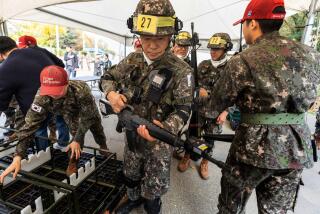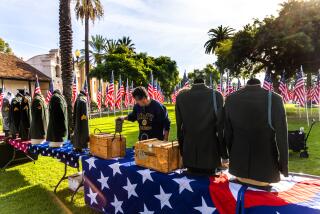Guard troops prepare for war zone
In the 15 months since Army National Guard Staff Sgt. Derek West returned from a tour of Iraq, he has closely watched developments there, listening to the news and following Internet reports from fellow soldiers about conditions on the ground.
On Sunday, as he prepared to return to the war-torn region with more than 600 members of the National Guard’s 1st Battalion, 160th Infantry Regiment, West said he had little doubt that he faced a different, and worsening, situation.
Still, West, who transferred from another battalion when he learned that the 160th needed more troops for deployment, echoed the sentiments of many of his colleagues, saying that despite the potential dangers and his wife’s concerns, he was excited to return.
“I think that what we are doing over there is good,” said West, 25. “It’s an honorable mission.”
The growing role of the National Guard in the Iraq conflict has been controversial. A report issued last week by a congressionally created panel warned that the current pace of National Guard deployments “is not sustainable” and also cautioned that the strain on the units could make states vulnerable in the event of natural disasters and major disturbances.
That report came on the heels of strong concerns expressed by the nation’s governors -- who met last month in Washington -- about their state militias being stretched to the limits.
Pentagon plans call for the deployment of more than 14,000 National Guard personnel to support President Bush’s planned “surge” of about 21,500 troops into Iraq this year.
Like West, when the call went out for volunteers for the 160th Infantry Regiment’s deployment, Sgt. Octavio Silva was one of more than 100 to raise his hand. With the growing demands on the National Guard, Silva said he felt that he would be tapped to go at some point before he retires, which he plans to do in four years. Silva had already done a war-zone tour in 2003.
The deployment is scheduled to last about 18 months, with a yearlong tour in Iraq and pre- and post-training. If Silva went now, he figured, he could be home in time to see his 3-year-old son start kindergarten.
As painful as it was for his family to see him go again, Silva said, he believed in the mission.
As his commanding officers spoke to the troops about what was being asked of them, Silva said he held back tears.
“I really believe that it’s better [to fight the conflict] there than here,” the 35-year-old said. “I was born in Mexico and came here at age 10. I feel like this country has given me a lot, and I have a lot to give back.”
But on the scorching tarmac at the Los Alamitos Joint Forces Training Base on Sunday, Silva’s wife, Maria, watched with a mixture of pride for her husband and anger that so much was being asked of her family and the families of the others.
“I was not prepared that some day my husband would be off to war,” she said. “I’ve said to him: ‘Aren’t you afraid?’ and he told me, ‘The day I signed on that dotted line I thought about this happening.’ ”
As an Army band played and a barbecue buffet was set up in a nearby hangar, men and women from units based in Inglewood, Fullerton, Glendale, San Pedro and Orange marched in formation for their formal send-off.
The battalion will fly out in two groups today and Tuesday to Mississippi, where it will train for its mission of providing convoy support. The deployment is one of the largest of National Guard troops since Bush announced plans to increase American troop levels in Iraq.
Since the start of the conflict in Iraq, more than 6,000 California National Guard troops have served in what has been the Guard’s largest combat mission since the Korean War.
Although officials from the California National Guard said they were trying to avoid involuntary mobilizations, recent Pentagon policy shifts mean most of the 20,000 Army and Air National Guard troops serving in the state are eligible to be deployed to Iraq, regardless of past tours served.
Some who volunteered to go, like Spc. Terry O’Neal, said they were motivated by the adventure, the chance to travel and, most significantly, a belief that the war is justified.
O’Neal, who served with the battalion in Kosovo in 2005, said he expected Iraq to be very different. His fellow soldiers who have served there have warned him to stay aware at all times.
“They tell me that it’s a different world over there,” said O’Neal, 21, who joined the National Guard four years ago. “That you have to watch your back with every man, woman and child; to keep your distance.”
Those who volunteered to return to Iraq are “phenomenal human beings,” said Lt. Ricardo Ferrell, 24, of Tacoma, Wash., who was preparing for his first deployment.
Lt. Sean Kelly, who flew helicopters in the first Gulf War, says the bond among those who serve is strong.
“I think they’re motivated to take care of soldiers and to take care of each other,” Kelly said.
The citizen soldiers, most of whom hold down civilian jobs in addition to their military duties, say they hear a range of opinions about the war effort in their everyday lives.
“I try to remind myself and the soldiers I lead that we took an oath that was outside of politics and the world we live in,” said Ferrell, who joined the Guard five years ago. “There’s never going to be a popular conflict when families have to send their loved ones to war. We still have to maintain our duty.”
For Maria Silva, 38, her strong belief in the importance of that duty has come at a price.
“My youngest is 3, and this morning when we were getting ready he said, ‘Where are we going?’ and I told him we had to say goodbye to daddy, and he just started crying. I think he understands, but it’s hard.
“I am very proud of our nation and what my husband is doing,” said the fifth-grade teacher. “But I also know that pretty soon I won’t be able to just reach him on his cellphone, and I know that the hours that go by will feel like weeks and the weeks will feel like months, because I’ve been through this before, and I’m going to be going crazy when I can’t reach him.”
Octavio Silva said he understood how his wife felt. At the same time, he said, she also respects his perspective.
“It’s my duty,” said Silva, whose day job is a customer service supervisor for the U.S. Postal Service. “The war is still going on, and it’s my responsibility as a leader myself to be there for younger soldiers and troops.”
Like West, Silva said he expected a far different tour than what he saw in 2003.
“Back then we were fighting an enemy,” he said. “Right now we don’t know who the enemy is.”
*
More to Read
Sign up for Essential California
The most important California stories and recommendations in your inbox every morning.
You may occasionally receive promotional content from the Los Angeles Times.











